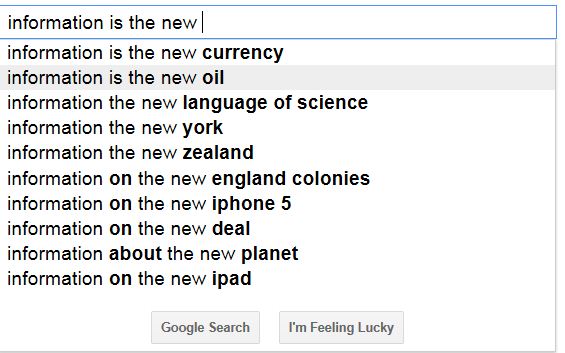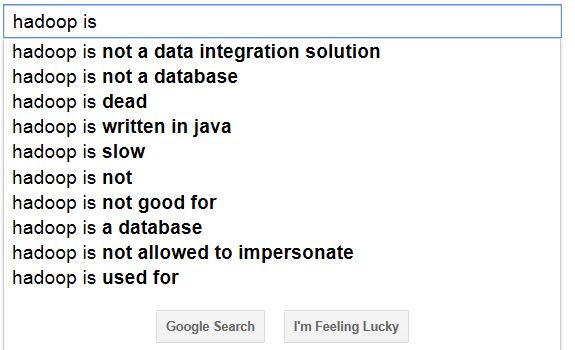My new favorite game is quite addictive, simple and, believe it or not, free. I call it "Stumped by Google Autocomplete."
Here's how it works: type any word or phrase into Google, and see what Google suggests with it's Autocomplete function. Like all things Google, this feature learns from searches that people are making. So, if people are typing in a phrase, Google will move that to the top of the list of suggested searches.
This leads to an interesting "parlor game." Ask your friends or coworkers to give you, say, two of the top five options in Autocomplete for the phrase "Big data is." I'll let you try this on your own, but if you guessed "dead" and "the future" you are right. Those are two of the top Autocomplete options for "Big data is." If big data is both dead and the future, then "big data for zombies" must be on the horizon.
The Google Autocomplete function is top of mind because of some research I'm doing on the value of data – and how to explain that value to others within your organization (look for more on that in the future). In the data management world, we often talk about the inherent value of data and how to place a value on that data. So, what is information, as defined by the Autocomplete function? I typed "Information is the new" into Google and got this result.
The top two responses are the new emerging themes when talking about the value of data. Information is oil, which is a solid metaphor given that big data is now gushing forth – and powering a new type of information age, just as the oil boom fed the industrial revolution. The other option is that information is currency, as it's a valuable entity that can be shared and exchanged across cultural, geographical and technical boundaries.
After trying "big data is " and "information is the new," I decided to try "Hadoop is..." Hadoop, more than any other big data topic, is getting more and more attention, I wanted to know what Google would say that Hadoop is. Here's what I found.
According to Google Autocomplete, Hadoop is a many splendored thing. The suggestions are about Hadoop being dead, that it is slow or simply what it's used for. The breadth of these questions isn't surprising for a technology that is relatively new.
Note that half of the top ten focus on what Hadoop is not, with the top two being negatives. As people have started searching Google about big data and Hadoop, it's natural to try to fit the new technology into an old construct. Naturally, there is content out there telling you that Hadoop is NOT a data integration solution nor a database.
One of the most popular posts on the Data Roundtable recently focused on another "Hadoop is not" phrase. In this post, Tamara Dull points out that Hadoop is not just for big data. It can play a role as a data staging environment, hitting squarely at the first Autocomplete suggestion (it's not a data integration solution, per se, but it has a role).
Tamara also points out that Hadoop can be used to process data in a low-cost, high-performance way, as well as a method to archive data more effectively. These are just a few of the use cases that Tamara identified for Hadoop. There are more coming in an upcoming white paper that she's publishing on how Hadoop can and will be used in the future.
While we will all be trying to figure out what's next in big data and Hadoop over the next few years, search traffic will be an interesting data point to validate what's hot and what's not. In the near future, expect Google to start identifying other trends once people start figuring out what Hadoop is. And what it is not.



2 Comments
Hadoop is too big to ignore.
That's a good one! Wonder when it will make the top 10.